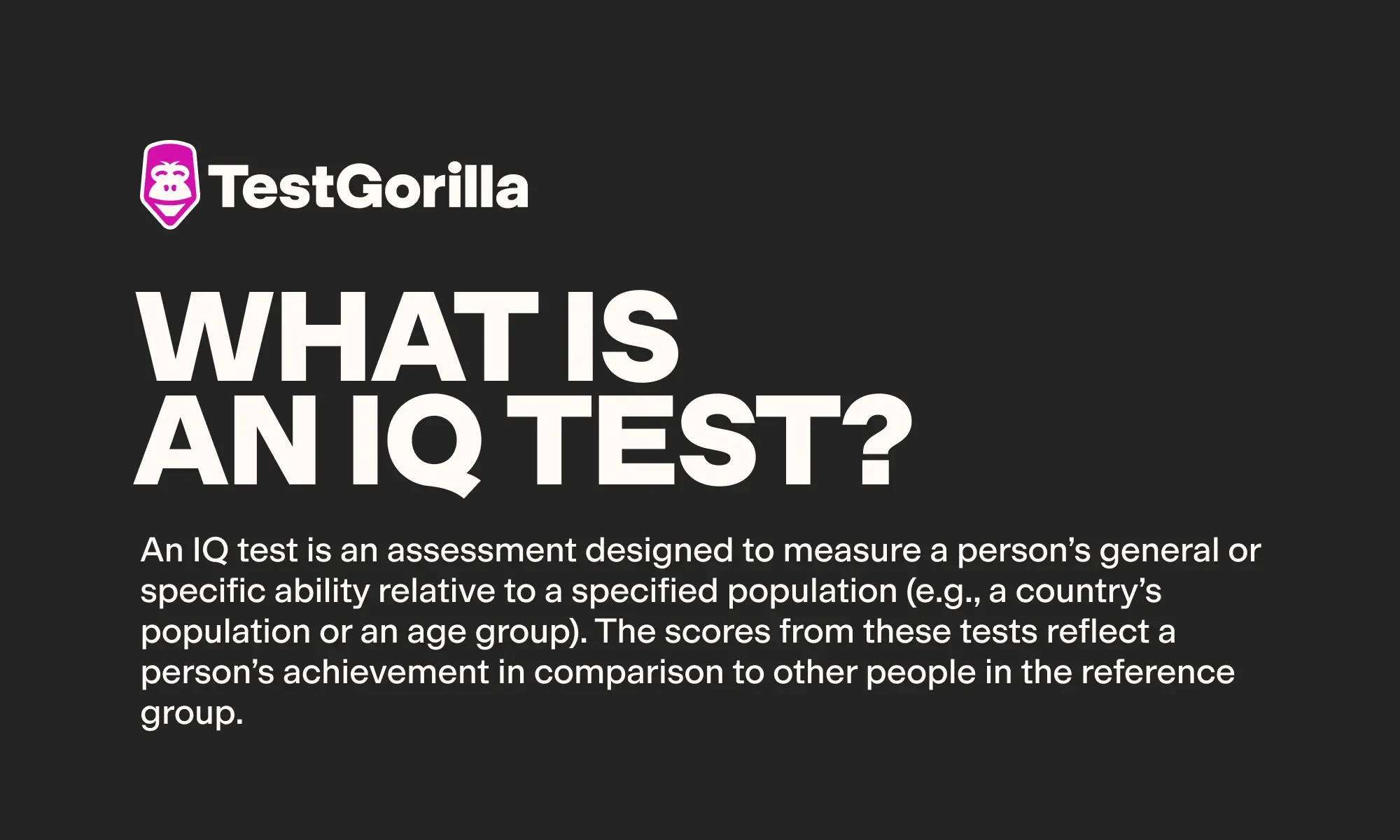IQ tests for employment are obsolete – here’s what to do instead
When it comes to finding the best candidates, IQ tests are a common topic discussed by HR professionals, recruiters, and hiring managers. However, the newest science on identifying high-potential candidates and job-relevant skills suggests there are better alternatives. These modern tools provide better insights into job-relevant qualities that truly matter for success in the workplace. Read on to find out how you can leverage these innovative methods to improve your hiring process and select the best talent.
What is an IQ test?
An IQ test is an assessment designed to measure a person’s general or specific ability relative to a specified population (e.g., a country’s population or an age group). The scores from these tests reflect a person’s achievement in comparison to other people in the reference group. These tests usually rely on one or more types of tasks that require participants to employ problem-solving, spatial reasoning, logical reasoning, language comprehension, and other skills.
The test usually has a series of questions that vary in difficulty. As your candidates complete these questions, their responses are scored and analyzed to generate a score. The test score is then compared to the results of a larger population to rank them and produce an IQ score. The IQ score is a numerical representation of where a person’s achievement on a test stands in comparison to a specified population.
The average IQ score is set at 100, meaning that the general population’s performance typically centers around this value. A score above 100 reflects above-average cognitive performance, while a score below 100 indicates below-average performance.
IQ tests are designed so that most people – rougly 68% – score between 85 and 115. Approximately 15% of individuals score below 85, and another 15% score above 115, reflecting the natural distribution of cognitive abilities.
Most IQ tests assess some or all of the following cognitive skills:
Verbal reasoning and comprehension
Mathematical skills
Logical reasoning and problem solving
Visual, spatial, and perceptual ability
Short-term and long-term memory
Processing speed
However, the use of IQ tests for candidate selection remains controversial. While IQ tests broadly assess general intelligence, they often fail to focus on the specific skills and abilities that are critical for job success. Using an IQ test is like giving someone multiple language tests to find out if they speak a single language – overly broad and imprecise for the task at hand.
For example, imagine an organization hiring a Spanish-speaking customer service professional. Instead of assessing candidates on their ability to speak all European languages (as an IQ test might metaphorically do), it’s much more effective to evaluate their specific Spanish language skills and relevant job competencies. Thankfully, better alternatives exist—tools that target the precise skills and traits needed for success in diverse roles.
Are IQ tests suitable for hiring?
While hiring for smarts can sometimes be effective, IQ tests are not a strong predictor of a candidate’s future job performance. Several limitations make IQ tests a poor choice for hiring:
Lack of job-specific relevance: IQ tests are designed to measure general intelligence, not the specific skills or competencies needed in a particular role. Research highlights that the closer a test aligns with the actual job, the more effective it will be at predicting success. IQ tests, by not focusing on skills relevant to specific work tasks, lack predictive validity in the employment context.
Limited scope of skills: IQ tests focus broadly on cognitive ability without evaluating more specific skills like attention to detail, adaptability, critical thinking, or job-relevant knowledge. Modern roles often demand a blend of cognitive and specific technical or interpersonal skills, which IQ tests alone fail to measure.
Potential for bias: Research shows that standardized IQ tests can inadvertently disadvantage individuals from certain cultural or educational backgrounds, introducing bias into the hiring process. Adverse impact concerns are common with IQ testing, where test design or cultural content may favor some groups over others.
Given these limitations, IQ tests are increasingly seen as outdated tools for employment assessment. To build an accurate and fair recruitment process, it is best to use a multi-measure approach to assessing candidates. Combining tests for job-relevant skills, soft-skills, and specific cognitive abilities with scientifically-backed interview practices can help you identify future top performers.
Cognitive ability tests are the key to a better hiring process
Recommended reading
The best insights on HR and recruitment, delivered to your inbox.
Biweekly updates. No spam. Unsubscribe any time.
Alternatives to job IQ tests
IQ tests alone don’t capture important workplace skills like communication, practical problem-solving, role-specific skills, motivation, and more. Moreover, they tend to be overly broad and fail to precisely capture the specific cognitive abilities that are most relevant to the role you’re hiring for. As a result, they’re often poor predictors of a candidate’s future job performance.
Pre-employment skills assessments made up of a comprehensive series of job-related tests are a better alternative to IQ testing, because they enable you to assess a wide range of skills and zero in on the ones that are most relevant to each role.
Combining multiple assessment methods – such as hard and soft skills tests, structured interviews, and personality and motivation surveys – is known as a multi-measure assessment, which is scientifically backed as the gold standard for hiring future top performers.
Instead of using IQ tests, consider a mix of:
Cognitive ability tests, which evaluate specific cognitive skills, such as problem solving, critical thinking, spatial reasoning, and more
Role-specific skills tests, which assess applicants’ suitability for a particular job
Personality and culture tests, which evaluate applicants’ extraversion, conscientiousness, motivation, culture add potential, and more.
This tailored approach enables you to focus on the most relevant skills for each position, resulting in a more accurate and equitable hiring process.
Recommended reading:
The benefits of using cognitive ability tests for recruitment
Cognitive ability tests and IQ tests overlap in some ways, but when it comes to predicting job performance, cognitive tests are often significantly more effective, especially when used in combination with role-specific skills tests.
Cognitive ability tests:
Assess skills that standard IQ tests cannot evaluate: While IQ tests focus on general intelligence, cognitive tests allow you to evaluate a broader range of abilities tailored to the needs of the role. These assessments can target specific skills such as mathematical reasoning, problem-solving, attention to detail, spatial and mechanical reasoning, reading comprehension, and more. Unlike predefined tasks in IQ tests, cognitive tests offer the flexibility to choose from a wide variety of options, enabling you to assess the abilities that matter most for a given position.
Predict job performance more accurately: Because they enable you to focus on the most relevant skills for the job, cognitive ability tests are a more accurate predictor of a candidate’s performance potential than IQ tests. Testing candidates on tasks similar to their actual job responsibilities provides a clearer picture of their potential on-the-job performance.
Help eliminate bias: By tailoring your pre-employment assessments to each role and focusing on skills that are truly essential for success, you can minimize bias sometimes present in IQ tests.
Assess skills that standard IQ tests cannot evaluate
How to hire the best talent with cognitive ability tests
Cognitive ability tests enable you to evaluate candidates’ skills in depth and hire the best talent, especially when combined with role-specific tests.
With TestGorilla, you can build an assessment of up to five skills tests, enabling you to get a full picture of applicants’ strengths and weaknesses and predict job performance accurately and objectively. Research shows that multimeasure assessments—combining different types of tests—are far more effective at evaluating candidates comprehensively. On our platform, you can assess cognitive ability, role-specific skills, communication, motivation, leadership skills, and a lot more, tailoring the process to your unique hiring needs.
You can also use our free problem solving skills test that enables you to evaluate applicants’ ability to define problems and analyze information to make the right decisions in complex situations.
To read more about our cognitive ability tests, visit our Cognitive ability tests for employment: The ultimate guide and 5 science-backed best practices for cognitive ability testing blog posts.
To get started, sign up for TestGorilla's free plan today.
Recommended reading:
IQ tests for employment: FAQ
1. Can you use IQ tests for recruitment?
Yes, although we don’t recommend it. Not only do job IQ tests often result in an unfair hiring process, exposing you to legal risks, they are also a poor predictor of job performance.
A combination of role-specific skills tests, personality and culture tests, and job-related cognitive ability tests are a better way to assess candidates’ skills and hire the best talent.
2. Are IQ tests for employment legal?
While job IQ tests aren’t strictly illegal, they can result in discriminatory hiring practices, which, in turn, can create potential legal issues in the US and most other countries.
According to guidelines by the Equal Employment Opportunity Commission (EEOC) in the US, any employment test must be non-discriminatory and should be a valid measure of an applicant's ability to perform the job.
Therefore, when using IQ tests for employment, an organization needs to be able to demonstrate the business necessity of using such tests and prove that they aren’t discriminatory towards specific groups of people. It is notoriously hard to do so with IQ tests, as they measure general abilities and not specific job-related skills. Tests of specific skills, cognitive abilities, and preferences usually have a much more direct connection with day-to-day job tasks.
A lot of the discussion on test bias is focused on the adverse impact, which you can read more about in our blog about adverse impact.
3. Should I use IQ tests during hiring?
While in theory you could use IQ tests for hiring (and some companies do), it’s not a good idea. Standardized IQ tests:
Don’t evaluate the specific range of skills for any particular role
Might lead to unfair hiring practices
Could expose you to legal risks
Instead, cognitive ability tests offer several benefits:
Measure skills that are directly relevant to the job
Provide a more accurate prediction of job performance
Allow for tailored assessments that match the needs of specific roles
Are designed to be fairer and more inclusive for a diverse candidate pool
4. Do IQ tests predict job performance?
While IQ tests might be helpful in assessing some cognitive abilities, their efficiency in predicting job performance is limited. They don’t measure many skills that are essential for success in the workplace, such as:
Role-specific skills
Practical problem solving
Time management
Communication
Emotional intelligence
Leadership skills
Moral and ethical judgment
Motivation and cultural competence
For this reason, we advise using cognitive ability and skills tests to hire the best candidates.
5. What are the alternatives to IQ tests for employment?
Cognitive ability tests are an excellent way to evaluate applicants’ cognitive skills and see whether they’re able to use them in real-life situations. These include abilities like:
You can combine them with role-specific skills tests to get a more accurate idea of a person’s skills and suitability for a specific job role – and use personality tests to gain a deeper understanding of each candidate’s behavior, motivation, and personality traits.
6. Why are cognitive tests a better predictor of job performance than IQ tests?
IQ tests don’t measure a lot of the most important workplace skills. Cognitive ability tests are specifically designed to assess skills that directly influence job performance, like problem solving, understanding instructions, and critical thinking. With our cognitive ability tests, you can measure any of those skills – and many more.
TestGorilla enables you to build your own customized assessment to evaluate the skills that are most important for any specific role and evaluate problem-solving abilities accurately. And the list is not limited to cognitive ability tests – you can also use our soft skills, preference, coding, language, and many more tests.
IQ tests don’t work. TestGorilla does.
An IQ test can result in painful mis-hires and harm your company’s reputation. To hire the best talent and minimize hiring bias, use a combination of job-related cognitive ability, role-specific, and personality and culture tests.
Sounds good? Sign up for our free plan, and start evaluating candidates’ skills today.
Let TestGorilla show you the ropes
You've scrolled this far
Why not try TestGorilla for free, and see what happens when you put skills first.























